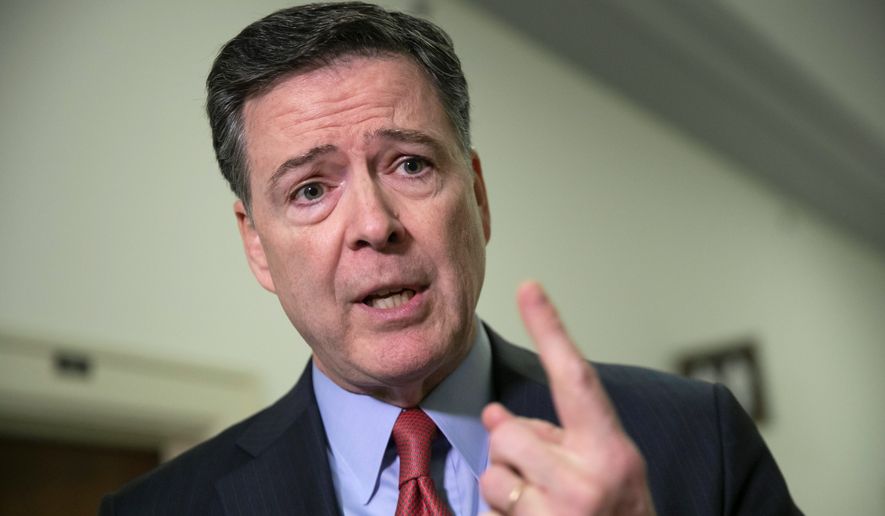Former FBI Director James B. Comey’s leaks, in addition to violating bureau policy, also could scare future witnesses away from cooperating in investigations because their confidential conversations could be exposed, a former high-ranking agent warns.
Lew Schiliro, who used to run the bureau’s New York office, said there is an element of trust in any FBI investigation that agents will abide by the rules, keeping secret information secret and not deploying it for their own purposes.
The Justice Department’s inspector general, in a report last week, found Mr. Comey broke both of those strictures.
“The real harm by the release of internal memos is that it seriously undermines the ability of FBI agents to gather information,” Mr. Schiliro told The Washington Times. “Americans need to trust the FBI to protect information. The self-serving unauthorized leak of internal documents erodes that trust.”
The inspector general found Mr. Comey improperly kept memos he wrote detailing private conversations with President Trump, even after he was fired, and then shared contents of the memos with his legal team and had one of them, a close friend, leak some contents to the press. The report concluded that Mr. Comey wanted to force the appointment of a special counsel to investigate Mr. Trump and figured that leaking his conversations would do it.
He proved correct, but analysts said the move has left another black eye on the FBI. Previous ones involved a report dinging Mr. Comey for ignoring bureau policy in his public exoneration of former Secretary of State Hillary Clinton for using a private email server; a report finding Deputy Director Andrew McCabe, now fired, had lied to investigators probing media leaks; and the discovery of reams of anti-Trump texts between Peter Strzok, a top investigator on both the Clinton and Trump probes, and Lisa Page, his mistress and an FBI lawyer. Ms. Page left the bureau, and Mr. Strzok was ousted.
SEE ALSO: James Comey’s Trump memos violated FBI policy; no prosecution for fired director
David Stebenne, a professor at Ohio State University who specializes in FBI history, said Mr. Comey’s behavior makes the FBI seem partisan.
“I don’t mean partisan as in Democrats and Republicans, but rather a bunch of D.C. insiders who are resisting this administration by trying to undermine it. There are a whole bunch of Trump supporters who believe that, and what Comey did follows that narrative,” Mr. Stebenne said.
Adding to the political taint are questions of competence.
The FBI admitted last year that it ignored a tip that Nikolas Cruz, accused in the Marjory Stoneman Douglas High School mass shooting, had signaled an attack before 17 people were killed at the school in Parkland, Florida.
Also, an agent pleaded guilty to assault charges last year after his gun went off while he was dancing at a Denver nightclub and wounded a bystander, and 16 women have sued the bureau alleging sexual harassment and discrimination at its training academy.
“It has been a series of problems like there is something institutionally wrong at the bureau, and not just Comey or one bad director. It appears to be something deeply rooted in practices at the agency,” Mr. Stebenne said.
More fallout could hit the bureau this year. The inspector general is set to release the conclusions of allegations that the FBI spied on members of the Trump campaign. Attorney General William Barr has ordered a U.S. attorney to probe the origins of the investigation into Mr. Trump and Russia.
Mr. Schilliro maintains that the bureau can restore its reputation, but he said it will require top officials to stay out of politics and rank-and-file agents to do what they do best: catch bad guys.
“The FBI’s reputation has been damaged, but it will recover because of the people they have working there every day who do their job,” he said. “I think it will take time and the FBI doing things it does so well like what it did in the 1970s taking down organized crime or solving major terrorism incidents and some of these mass shootings we are seeing.”
Mr. Schilliro gives current FBI Director Christopher A. Wray high marks for steering the bureau away from politics.
Mr. Wray has eschewed publicity since his confirmation in 2017, drawing contrasts with his predecessor, Mr. Comey.
“I think Wray is doing what he can to restore confidence in the FBI by staying out of the limelight. He is working independently, which is hard to do in this administration,” Mr. Schilliro said. “He is not a grandstander, which the bureau needs because we shouldn’t know who the director of the FBI is.”
• Jeff Mordock can be reached at jmordock@washingtontimes.com.




Please read our comment policy before commenting.